B2B SEO is Being Rewritten By AI Search
- Vincent Grippi

- Aug 7, 2025
- 6 min read
For better or worse, AI is shaking up a lot of marketing - but SEO’s taking the biggest hit. And every time anything changes in SEO, people rush to declare it dead. Usually, it’s just a Google algorithm tweak. But this time, it’s much bigger, as the entire search engine experience is getting overhauled.
But is SEO actually dead? No.
It’s more like Twitter - not gone, just different.
And that means B2B marketers need to rethink their whole approach. We’ll get into what that looks like, but first, let’s start with what’s changed.
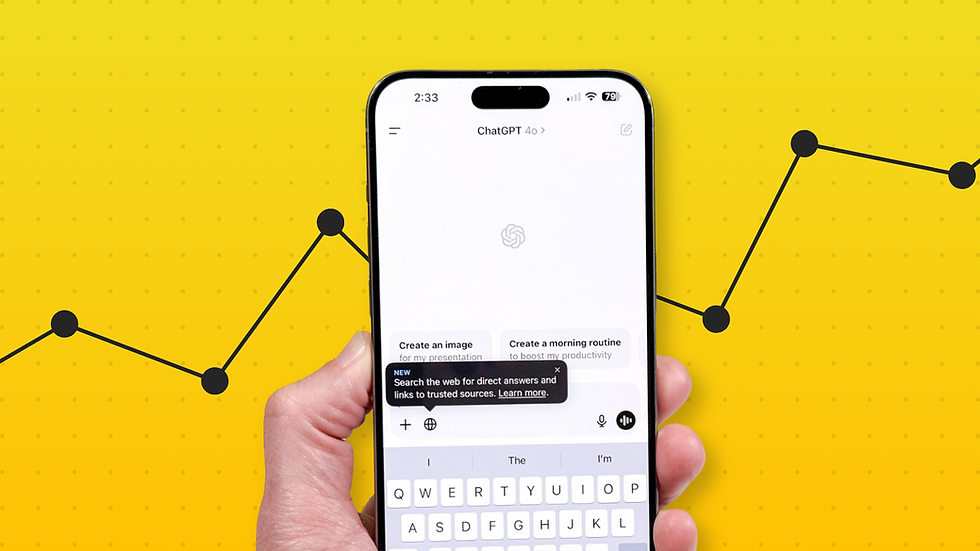
The AI Search Arena
AI search is taking off and it’s changing how people find and consume information.The traditional search engine experience is like going to the library and digging through the card catalog to find the book you need.
AI search, on the other hand, is like walking up to the librarian and asking if the spider dies at the end of Charlotte’s Web and they just tell you.
🚨Spoiler alert: She dies. And her name was Charlotte.
Where traditional search focuses on discovery, AI search shifts the experience toward real-time dialogue.
It uses natural language processing to understand your question and pulls answers from both training data and the live web. From there, you can keep the conversation going - no need to click a bunch of links.
There are a handful of key players in the AI search arena:
First, you’ve got the frontier AI chatbots like ChatGPT, Claude, and Gemini - which are fully conversational. You ask a question and they give you an answer.
Then there’s Perplexity, which is basically a chatbot cosplaying as a search engine.
Next up, is the heavyweight, Google. Google is double-dipping with two AI search experiences integrated within its search engine. AI Overviews, which summarizes search results above the links, and AI mode, which gives you the full chatbot search experience, like the others we mentioned.
Finally, there’s Bing, which offers the same chatbot experience with Copilot. Personally, I think they missed a golden opportunity to call it Bingman. Cowards.
Ok, so we’ve met the players - now let’s check the scoreboard...
Traditional Search vs. AI Search
Starting with traditional search engines, it’s clear that Google’s still the MVP. According to StatCounter.com, they own 89.6% of the market in 2025. Some sources peg this number to be a few points higher or lower, but one thing’s clear: Google still dominates search.
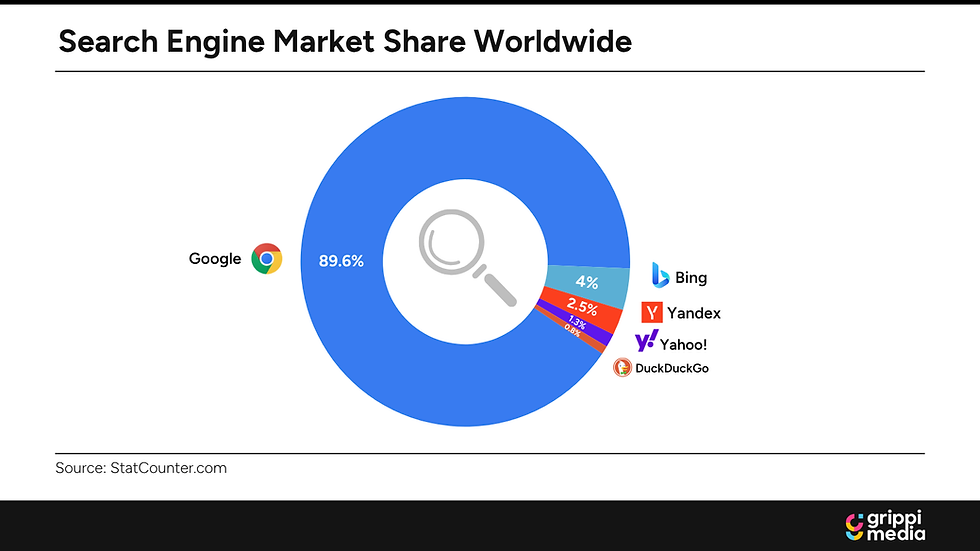
Meanwhile, AI search has been gaining steam. Unsurprisingly, ChatGPT dominates the chatbot search space, with a 79.8% market share. In the first half of 2025 alone, ChatGPT saw a 33% increase in weekly active users.
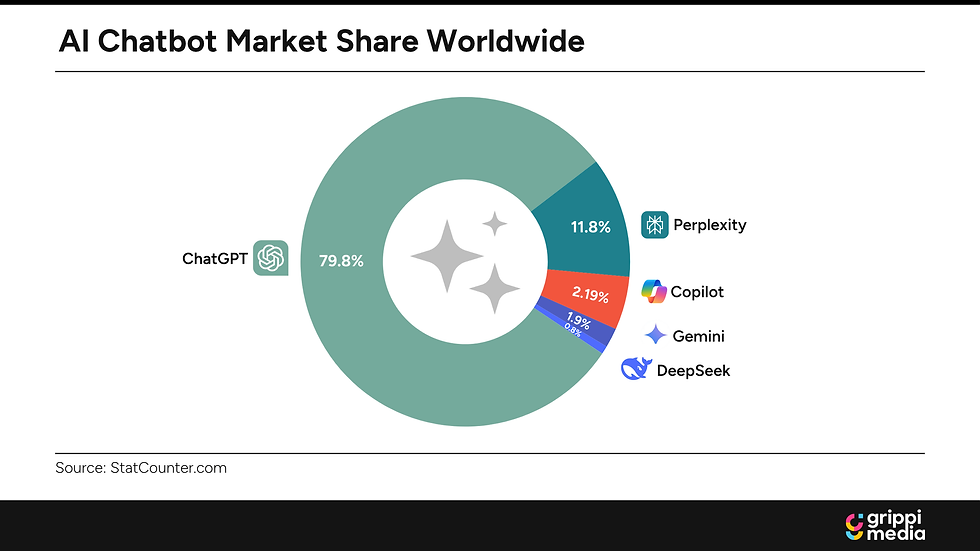
But that momentum still pales in comparison to Google. When you zoom all the way out. According to a report from SparkToro, in 2024, Google had more than 14 billion searches per day. At best, ChatGPT had just 37.5 million. That means Google processed 373 times more searches!
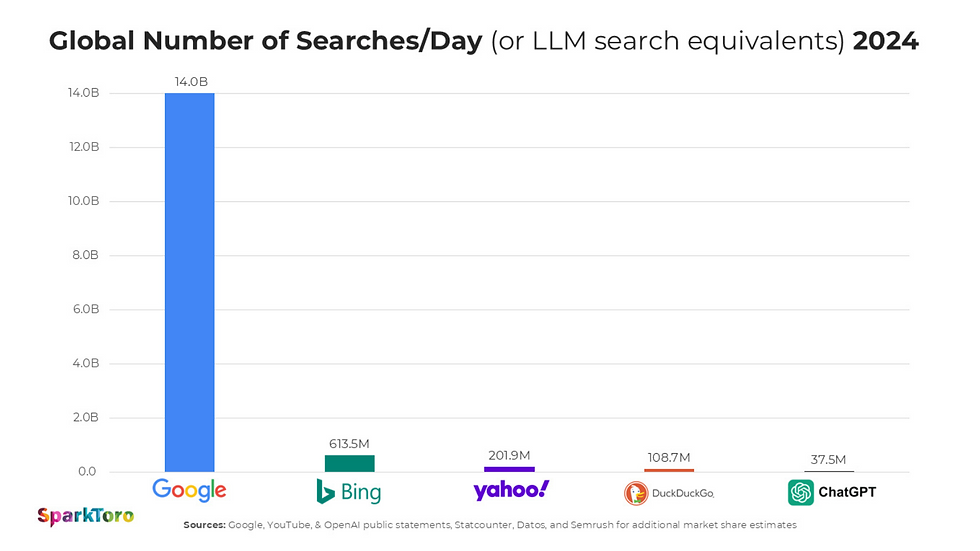
How AI Search Complicates B2B SEO
While AI search is growing, it’s still oceans behind Google. So, it’s tempting to think of them as separate things: traditional search over here and AI chatbots over there.
But here’s the problem: Google is blurring the line.
Remember earlier, when I said: “Google is double-dipping with two AI search experiences integrated within its search engine.”
Well, thanks to AI overviews showing up at the top of traditional search results, websites are getting hammered. A study from Ahrefs found that AI overviews reduce the average CTR for top ranking pages by 34.5%.
And now, with AI Mode rolling out to all users, it’s only going to get trickier.
In a recent interview with Lex Fridman, Sundar Pichai made it clear that more AI Mode features will be integrated directly into Google’s main search page.
So, there are two major challenges for B2B marketers here. The first one is obvious: an even steeper drop in search traffic. The second is reliability.
In an ideal world, when you ask an AI Chatbot if Charlotte dies at the end of Charlotte’s Web, you should get the right answer: Yes.
But because LLMs hallucinate so often, an AI Chatbot might tell you that Charlotte is alive in Uruguay, where she opened an Etsy shop selling oven mitts spun from her own webs. In fact, studies show that only 51% of AI search results are actually factually accurate.
It’s one thing to get a book ending wrong. But when AI shares misinformation about your business, the cost can be real.

GEO and AEO = BSEO
So, how do B2B marketers overcome these challenges? As with anytime SEO is declared dead, people are rushing to rebrand old ideas with shiny new buzzwords.
Remember when voice assistants dropped and everyone hyped the idea of Voice Search? Yeah, we all know how that turned out...
Two trendy abbreviations that have been getting a lot of attention are Answer Engine Optimization (AEO) and Generative Engine Optimization (GEO).
Both center on the idea of structuring content so that it can be cited directly in AI search results. But there’s no hard proof that any one tactic reliably accomplishes that. Just like there’s no guarantee that getting cited in AI search results will turn into clicks or that what was cited is correct.
Despite the flood of AI search “hacks” out there, Google has been clear - appearing in AI results doesn’t require a new playbook. Just keep following the core principles of effective SEO.
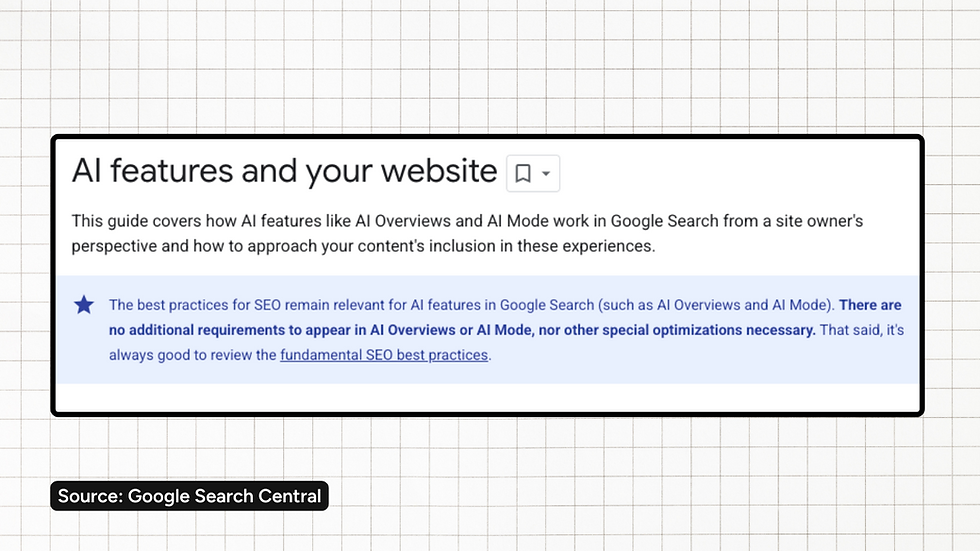
Call it what you want, AEO, GEO, or REO Speedwagon - it’s really just SEO.
Instead of focusing so much on tactics, I think b2b marketers need to zoom out and reframe how they think about SEO, now that the game has changed.
Traditional SEO was all about showing up at every stage of the funnel and getting people to click. But the B2B marketing funnel is deader than every class pet forgotten during the 2020 lockdown.
B2B buyers don’t move in tidy, predetermined steps. They do their own research and validate solutions across multiple mediums.
Modern SEO is less like a map and more like a compass.
It’s not about trying to dictate the journey, because you can’t. It’s about aiding the buyer’s research in a meaningful way and validating your business as the right direction to go.
B2B SEO in the Age of AI Search
This space is evolving fast, and there’s no tried and true playbook for keeping up. But here are a few safe, practical things B2B marketers can do to support buyer research and validation, without gambling time and resources on trendy tactics.
Focus on Product and Service Related Searches
Prioritize keywords and questions that buyers ask when researching and evaluating solutions like yours.
🧠 Examples:
Comparison guides
Use cases
Pricing information
Integration questions
ROI expectations
Security and compliance details
Prioritize anything that helps buyers feel confident and informed.
For small and mid-sized teams with limited resources, cranking out blog posts to chase topical authority was already unrealistic before AI search. That said, I would avoid broad, informational content, as it is more likely to get summarized and skimmed than drive any real engagement with your brand.
Reputation Management
When buyers are validating a solution, your reputation can make or break their decision. That’s why it’s critical to showcase social proof wherever they’re looking.
🧠 Examples:
Testimonials
Reviews
Case studies
Customer spotlights
Public relations
With studies finding that AI search results are wrong more than they’re right, it’s important to do what you can to amplify social proof both on and off your site.
Proprietary Data and Research
When buyers are doing in-depth research, original data is one of the few things that still captures attention and earns trust.
🧠 Examples:
Reports
Surveys
Impact metrics
Market research
Stats
Findings
Studies you fully own and can publish under your brand
With AI search often summarizing answers without context, proprietary data gives buyers a reason to click through and validate the source. This helps your content go even further, as people start sharing it, citing it, and spreading it for you
SEO Fundamentals
In the same way you shouldn’t create content for search engines, you shouldn’t create content for answer engines. When the biggest name in search tells you to practice good SEO fundamentals, it’s worth listening to them.
🧠 This means:
Prioritizing content quality
Enriching content with multimedia like videos, podcasts, and graphics
Maintaining a technically sound website
Making content easy to find with strong internal linking
Ensuring content is available in text form, since AI crawlers often struggle with JavaScript
Boring? Maybe. But it probably works better than 99% of the B.S. flooding your LinkendIn feed. Come to think of it…you can actually say this about most things in life!

Conclusion
AI search will continue to shake things up for the foreseeable future. But as of now, there are no hacks or secret formulas for gaming results.
If you’re a B2B business that doesn’t depend on clicks for revenue, the smartest thing you can do is reframe how you approach SEO. Not as a way to chase clicks, but as a way to support buyer research and validation.
Because like all things in the AI hype tornado, the key isn’t buying into panic - it’s staying grounded in reality.
